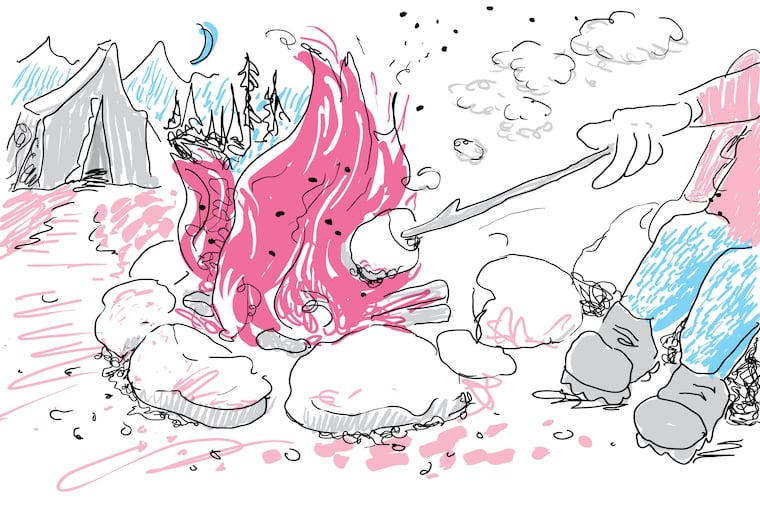Can I go camping in Pennsylvania during the coronavirus?
Summer vacation is (probably) canceled. Want to go camping during coronavirus instead? Here's how.

Your summer vacation may look a whole lot different this year. Instead of hopping on airplanes or planning future trips, people are now flocking to parks and trails (sometimes in numbers that are not safe), grateful for the fresh air.
While exploring the outdoors, many are wondering, is camping allowed? Is it safe?
Some campgrounds in Pennsylvania are open with restrictions, but group tent camping sites at state parks in the Philadelphia region remain closed. New Jersey’s campgrounds are open, and Delaware campgrounds are set to reopen on June 1.
What’s reopening
Gov. Tom Wolf announced that beginning May 1, privately owned campgrounds (along with golf courses, marinas, and guided fishing trips) may reopen statewide, part of a gradual reopening. They will be required to follow safety rules from the Wolf administration, including social distancing and mask wearing.
“As the weather warms and daylight lengthens, enjoying time outdoors is an important way to manage stress,” Wolf said. “As we start to take measured, limited steps to reopen our commonwealth, reopening these industries will help to rebuild our economy and strengthen our mental health.”
According to CDC guidelines on parks and recreational facilities, you’re strongly discouraged from choosing locations far from home. Minimizing travel helps to limit our physical contact at places like gas stations and avoid spreading the disease.
» READ MORE: Here are the restrictions on travel right now
Campsites and cabins should only be used by members living in the same household, and all visitors are advised to practice 6-foot social distancing from those outside their camp at all times.
If you want to plan a trip to a local, privately owned campground, call first to check that it’s taking reservations and what additional safety measures may be in place.
Camping options
“Primitive camping” at state forests has always been allowed.
“This is overnight camping where all equipment is transported in limited trips by nonmotorized vehicle methods, including watercraft, bicycle, or horse, and where a motorized vehicle is not located near or part of the camping experience," said Terry Brady, press secretary for the Department of Conservation and Natural Resources.
“We have 20 state forest districts — comprised of more than 2.2 million acres — and that is where the primitive camping is allowed,” Brady said.
» READ MORE: Are state parks open? Can I go for a hike?
If you want to go primitive camping, it’s advised that you tell the forest district’s office about your plans (location, dates) for safety reasons.
Campgrounds in state parks will stay closed through Thursday, May 14. And it’s possible the reopening date will be delayed, especially for state campgrounds close to populated areas.
“As the state moves to reopening in select areas, parks in the northern and northwest sections of the state are likely to be the first to reopen some campgrounds and other facilities,” said Brady. “Cabins are likely to follow, although we must allow returning staff the ability to thoroughly clean them and prepare them for use.”
What’s still closed, and how to stay safe
All playgrounds, nature play areas, interpretive centers, amphitheaters, and group camping facilities statewide will remain closed indefinitely. All events and large gatherings at state parks and forests are canceled, and new reservations for these activities are not currently being taken.
Pavilions and other facilities will only be available for groups under 25. Picnic tables in state parks will be spread out to help minimize crowds.
To keep state parks and forest lands safe, the Department of Conservation and Natural Resources advises:
Avoid crowded parking lots and trailheads
Bring a bag and either carry out your trash or dispose of it properly
Clean up after your pets
Avoid activities that put you at greater risk of injury, so you don’t require a trip to the emergency room
» READ MORE: How to safely go fishing right now
Do not go camping or hiking if you’re feeling sick. As per usual, follow basic health guidelines, like social distancing, avoiding touching your face, taking hand sanitizer with you and using it regularly, and covering your nose and mouth with a tissue or flexed elbow when coughing and sneezing. Bring a mask in case you have to interact with other people at the campground. And since you’re staying overnight in a place with no laundry facilities, you’ll probably want to pack more than one.
“Finding the balance between enjoying the outdoors and staying safe is only possible when all Pennsylvanians are abiding by the same precautions,” Wolf said.
Worried about mosquitoes? The good news: neither mosquitoes nor ticks are shown to spread the coronavirus.
To stay up-to-date on the phased reopening and what it means for campgrounds, you can check pa.gov/guides/responding-to-covid-19. Information about state parks and forests is available on the DCNR website (dcnr.pa.gov). Updates are also being provided on DCNR’s Facebook and Twitter accounts.